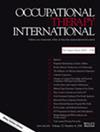生活方式再设计计划对韩国大学生幸福感影响的准实验研究
IF 0.9
4区 医学
Q3 REHABILITATION
引用次数: 0
摘要
背景。韩国大学生(KUS)面临着许多可能危及其身心健康的挑战,包括学业压力、同龄人压力、不规律的睡眠模式、不健康的饮食习惯、缺乏体育锻炼以及时间管理方面的困难,从而导致不健康的生活习惯和生活方式的波动。因此,越来越需要针对这一群体的干预措施。研究目的本研究探讨了生活方式再设计(LR)干预对韩国大学生福祉的影响,包括职业参与、满意度、感知压力水平和生活质量。研究方法一项由 33 名韩国大学生(17 名干预者,16 名对照者)参加的准实验研究评估了为期 10 周的生活方式再设计干预对学生幸福感的影响。干预前后的变化通过加拿大职业表现测量(COPM)、压力反应量表(SRI)和世界卫生组织生活质量量表简写本(WHOQOL-BREF)进行测量。干预由训练有素的职业治疗师提供,包括个人和小组课程。干预结果据统计,患者的职业表现有了明显改善。虽然在其他方面没有持续达到统计学意义,但 LR 组显示出积极的趋势。与对照组相比,LR 组的 COPM 满意度得分更高,SRI 得分更低(表明压力减少),WHOQOL-BREF 得分更高。结论本研究有助于了解改变生活方式和习惯对大学生健康的重要性,尤其是在学业压力和同伴压力的背景下。未来的研究将使用更大、更多样化的样本,并延长干预时间,这将有助于进一步了解大学环境中生活方式改变计划的益处。本文章由计算机程序翻译,如有差异,请以英文原文为准。
A Quasi-Experimental Study Investigating the Impact of a Lifestyle Redesign Program on the Well-Being of Korean University Students
Background. Korean university students (KUS) face numerous challenges that can jeopardize their well-being, including academic stress, peer pressure, irregular sleep patterns, unhealthy eating habits, lack of physical exercise, and difficulties in time management, resulting in unhealthy habits and fluctuations in lifestyle. Consequently, there is a growing need for interventions tailored to this population. Aim. This study explored the effects of a Lifestyle Redesign (LR) intervention on Korean university students’ well-being including occupational participation, satisfaction, perceived stress levels, and quality of life. Method. A quasi-experimental study with 33 KUS (17 intervention, 16 control) assessed the effects of a 10-week LR intervention on well-being of the students. Pre- and postintervention changes were measured using Canadian Occupational Performance Measure (COPM), Stress Response Inventory (SRI), and World Health Organization Quality of Life Scale Abbreviated Version (WHOQOL-BREF). The intervention, delivered by trained OTs, comprised of individual and group sessions. Results. Statistically significant improvement was observed in occupational performance. While statistical significance was not consistently achieved in the rest of other areas, the LR group displayed positive trends. The LR group exhibited higher COPM satisfaction scores, lower SRI scores (indicating reduced stress), and elevated WHOQOL-BREF scores compared to the control group. Conclusion. This study contributes to the understanding of the importance of addressing lifestyle changes and habits in the well-being of university students, especially in the context of academic stress and peer pressure. Future research with larger, more diverse samples and extended intervention periods may offer further insights into the benefits of LR programs in university settings.
求助全文
通过发布文献求助,成功后即可免费获取论文全文。
去求助
来源期刊

Occupational Therapy International
REHABILITATION-
CiteScore
2.50
自引率
6.70%
发文量
121
审稿时长
>12 weeks
期刊介绍:
Occupational Therapy International is a peer-reviewed journal, publishing manuscripts that reflect the practice of occupational therapy throughout the world. Research studies or original concept papers are considered for publication. Priority for publication will be given to research studies that provide recommendations for evidence-based practice and demonstrate the effectiveness of a specific treatment method. Single subject case studies evaluating treatment effectiveness are also encouraged. Other topics that are appropriate for the journal include reliability and validity of clinical instruments, assistive technology, community rehabilitation, cultural comparisons, health promotion and wellness.
 求助内容:
求助内容: 应助结果提醒方式:
应助结果提醒方式:


